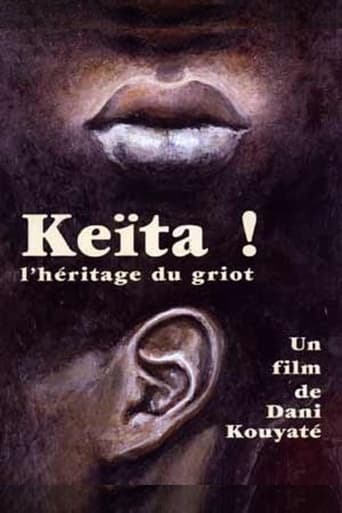

I do not know what movie you were watching but Keita was the most god awful movie I have ever watched. We were forced to watch this in class and it will never leave my memory. The acting was horrible, the plot was nonexistent, and non conclusive. Why would he be expelled for listening instead of studying when he could have easily done both? And why were the hunters deemed worthy of the buffalo, they were just two suck-ups who gave the "wild" lady food and drink!
... View More(Very mild spoiler: I mention what the plot is about, most of which will be evident in the first fifteen minutes of the movie.)I concur with Gemmabean's review above. The movie is about culture clash. The boy is poised between his tradition-bound father, and his elegant, westernized mother (speaking French), who is more concerned about the boy's important upcoming exams than in his initiation by the Griot. The movie contrasts home-scenes that are thick with emotion, and heritage scenes that depict the tale the boy must learn. The heritage tale is fanciful, and it is brought to life with a fine treatment in the movie.The contrasts are exceedingly well done, and the movie has a very satisfying conclusion.This movie is one of the great ones.
... View MoreThis film is a marvelous way to show the dichotomies between Europeanized West African education and a traditional form of West African education (initiation). At the same time, because all of the main characters are muslims, it implicitly shows that synchretism does eventually change cultures and create new ones.At the beginning of the movie we see a spirit incite a griot to awaken. Then the griot travels to a city where he visits a family specifically to speak to the youngest member of the family to do his work of passing on the story of the young man's name (Keita). The young man is so entranced by the long story that the neglects his schoolwork and this is where the conflict begins. In the meantime we see the difference in behavior between the young man's parents and the griot (Westernized versus traditional from eating methods to sleeping preferences).The griot's ensuing discussion with the schoolteacher is itself worth seeing the movie for...the schoolteacher does not know the meaning of his own name yet is charged with teaching young children the "knowledge" they need to succeed. The question becomes what sort of success? This film shows the merits of Afrocentric education without preaching and also entertains.
... View MoreIt is an ordinary afternoon for young Mabo Keïta, at home, in Burkina Faso (West Africa). While his parents are taking a nap, he reads a schoolbook on the front porch when a stranger - an elderly man carrying his own hammock - appears for an unexpected visit. It turns out that the old man is a griot, a West African musician/entertainer whose performances include tribal histories and genealogies. The position of a griot is a time-honored one and passed down from father to son for many generations.The griot announces that he's on a mission and has arrived to teach young Mabo about his history. Mabo is curious and eager to learn about his past, and soon his interest in schoolwork diminishes. As a result, a disagreement arises between his parents. Mabo's mother thinks that a griot's work is no longer important. She and his teacher don't want the griot's lessons interfering with Mabo's schoolwork. On the other hand, the boy's father doesn't want to deny his son the tradition of lessons from the griot - after all, they've been an important part of his family for generations. There is a conflict between modern and traditional ideas.Writer and director, Dani Kouyaté comes from a long line of griots in his family. His father, Sotigui Kouyaté, a real life griot, plays the griot in the movie. Perhaps, for that reason, Kouyaté is successful in transferring the art of oral storytelling to the movie screen. Through the griot and young boy, the Sundjata epic, set in early 13th century, is retold in the film. It is about a man who turned his nation (the Mande people) into the great Malian trading empire (in West Africa). It's a riveting story full of magic realism.The lessons of Keita: The Heritage of the Griot - traditional versus modern (Western) views and the fact that our history plays an important to our lives - not only applies to the African culture, but it all cultures. "It's an old world and the future emerges from the past," the griot tells Mabo. This is one of my all-time favorite movies - the setting, music and actors tell the story very well. I highly recommend it to one and all - young and old.
... View More